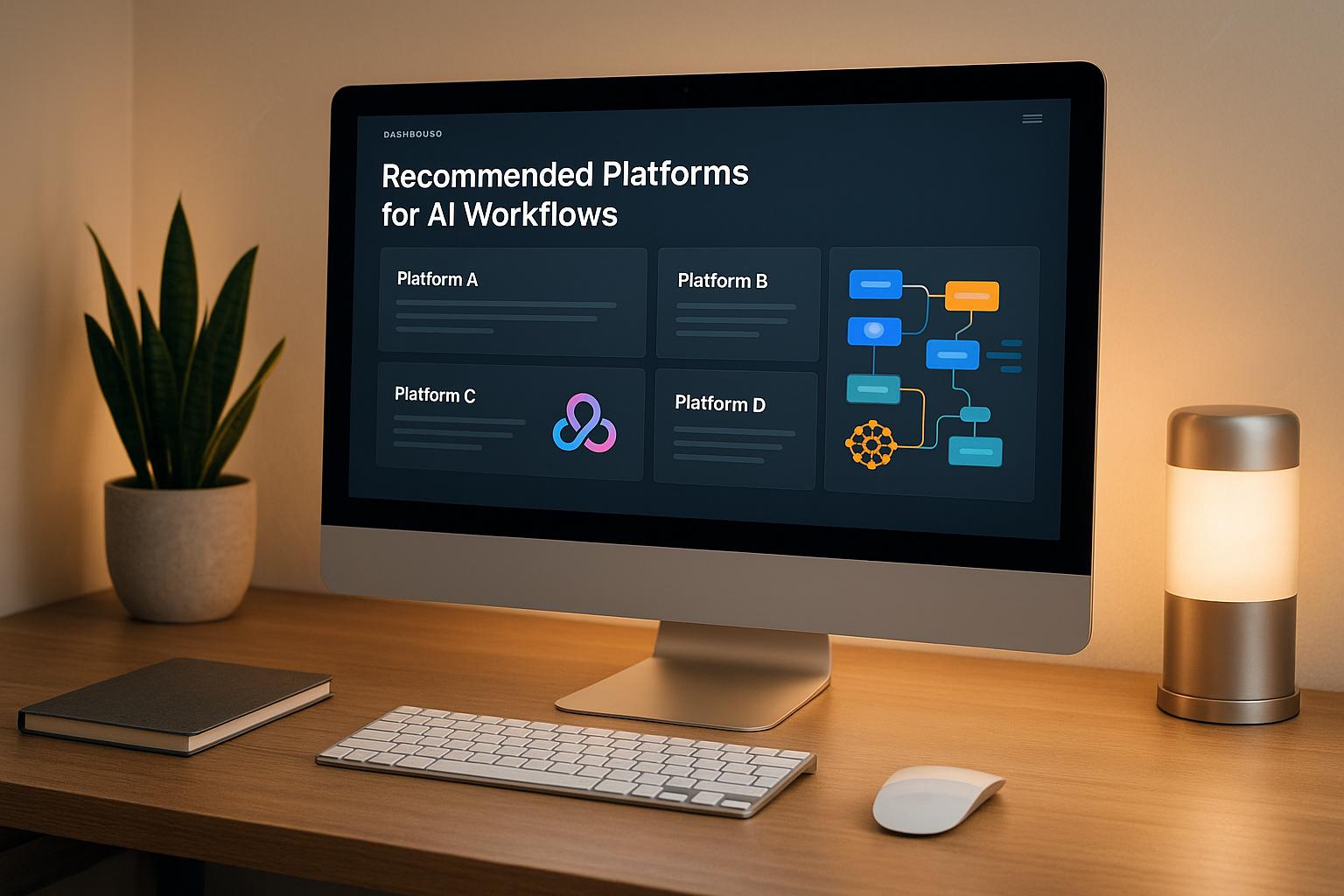
AI workflow orchestration is transforming how businesses operate, addressing critical challenges like interoperability, cost management, and governance. With 78% of Fortune 500 companies already adopting these tools, the market reached $3.8 billion in 2024 and is growing at a staggering 47% CAGR through 2027. If you're looking to simplify AI adoption, reduce costs, and ensure compliance, these platforms offer tailored solutions.
| Platform | Starting Price | Core Features | Best For |
|---|---|---|---|
| Prompts.ai | $0 (Pay-as-you-go) | Unified access to 35+ LLMs, cost controls | Enterprises reducing tool sprawl |
| Gumloop | $37/month | Visual builder, built-in LLMs | Small teams, non-technical users |
| n8n | Free (self-hosted) | Open-source, custom integrations | Developers, technical teams |
| Workato | $10K+/year | 1,200+ connectors, enterprise-grade governance | Large enterprises |
| Tray.io | Custom pricing | Low-code automation, API-heavy workflows | Data-intensive operations |
From cost savings to enterprise-grade compliance, these platforms cater to a variety of needs. Whether you're a small team or a global enterprise, there's a solution here to help you unify, automate, and scale your AI workflows.
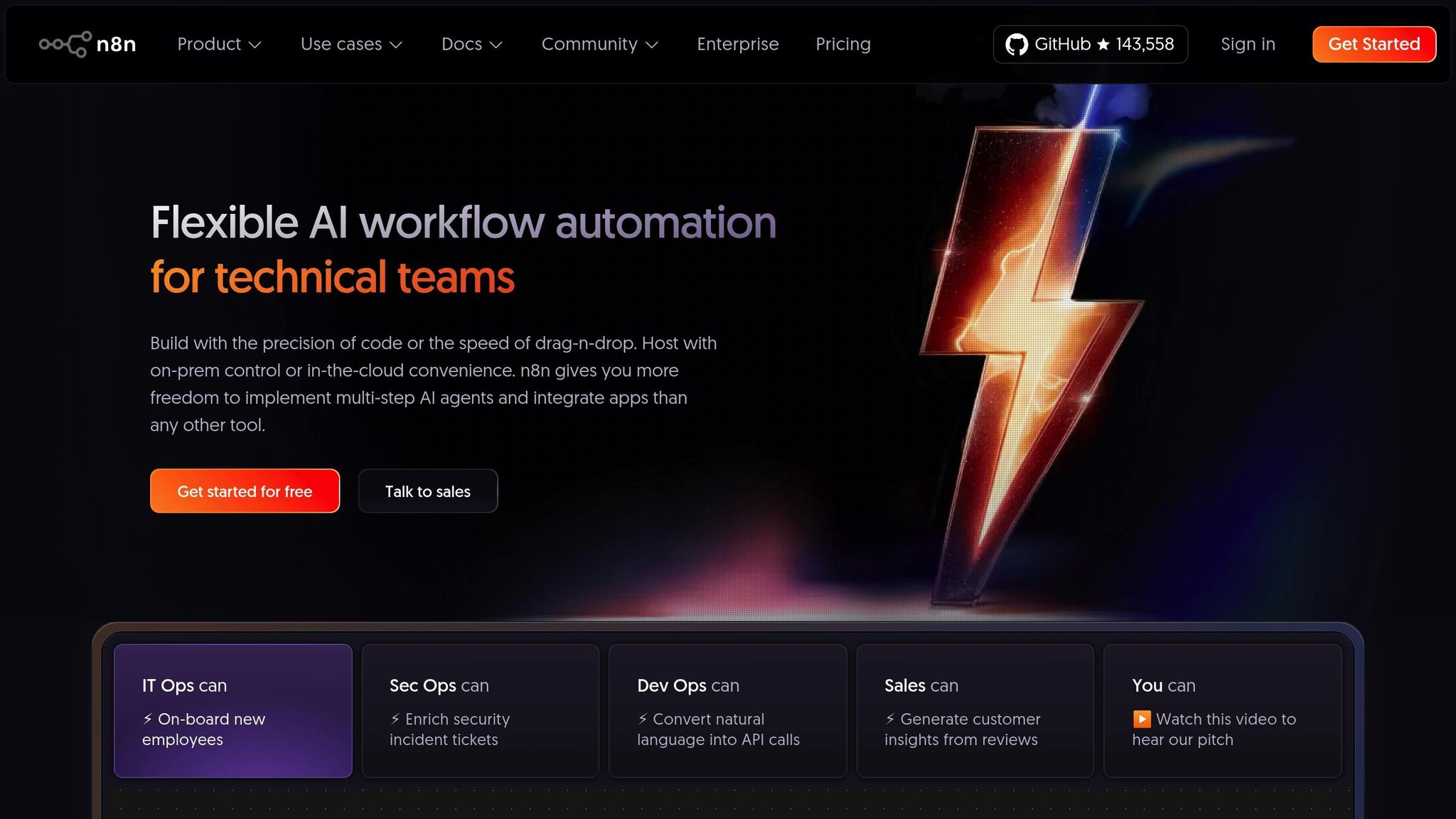
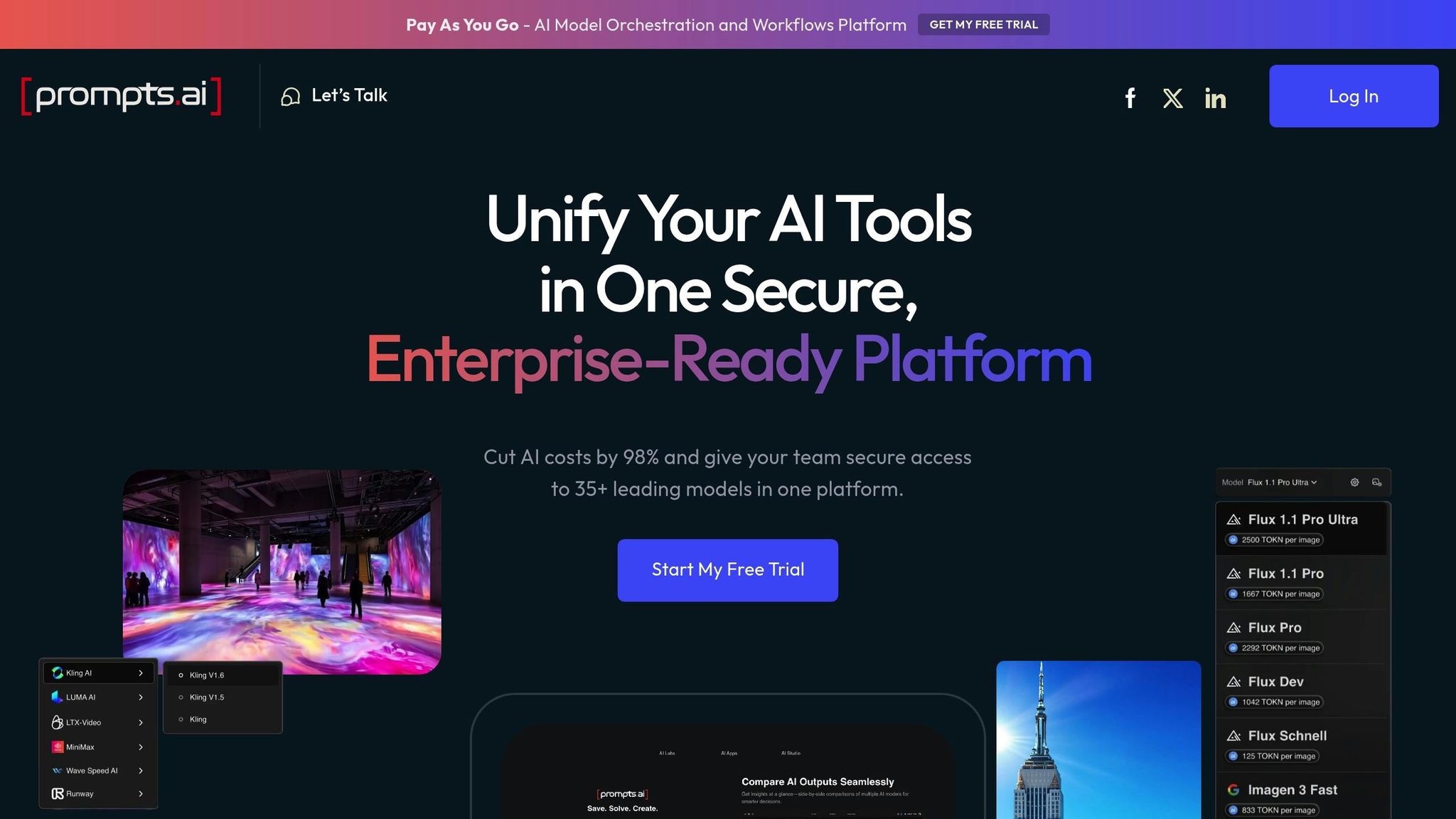
Prompts.ai brings together over 35 top-tier language models - including GPT-5, Claude, LLaMA, and Gemini - within a single, secure platform.
One of the platform's standout features is its ability to seamlessly connect a variety of AI models while integrating with essential enterprise applications. This allows users to compare large language models side-by-side, a feature that has reportedly increased team productivity by as much as 10×. For instance, in 2025, architect Ar. June Chow used Prompts.ai to evaluate multiple LLMs, streamlining project development and driving efficiency. Similarly, Johannes Vorillon, a visual AI director, utilized the platform to prototype ideas, refine visuals, and execute creative projects with speed and precision, turning ambitious visions into tangible results faster than ever.
Prompts.ai also integrates with widely used tools like Slack, Gmail, and Trello, enabling automation of workflows across various departments. Frank Buscemi, CEO & CCO, highlighted how the platform simplifies content creation and automates strategic tasks, allowing his team to concentrate on broader, strategic goals. This level of integration is a cornerstone for achieving the streamlined AI workflows discussed throughout this article.
Prompts.ai is designed with cost efficiency in mind. Using a pay-as-you-go TOKN credit system, users only pay for the AI resources they consume, cutting software costs by up to 98% compared to managing multiple subscriptions. The platform includes a built-in FinOps layer for real-time cost tracking and token usage insights. Additionally, its dynamic routing feature ensures that the most cost-effective AI model is selected for each task. Steven Simmons, CEO & Founder and creative director, shared that he now completes rendering and proposal tasks within a single day, significantly reducing turnaround times.
Security and compliance are at the core of Prompts.ai’s enterprise solutions. The platform holds AIRTP+ and SOC 2 certifications, meeting the stringent requirements for enterprise deployment. Role-based permissions allow for precise access control, while detailed audit trails track every AI interaction, ensuring compliance with multiple regulatory frameworks. By providing unified model access, the platform minimizes the need to share sensitive data across multiple third-party services.
| Security Feature | Prompts.ai |
|---|---|
| Primary Strength | Enterprise-grade governance with unified model access |
| Data Security | FinOps-supported compliance with secure workflows |
| Compliance and Audit | Comprehensive audit trails for multi-framework compliance |
| Access Controls | Granular, role-based permissions for team-level governance |
| Cost Transparency | Pay-as-you-go TOKN credit system tied to actual usage |
Prompts.ai offers flexible business plans to suit organizations of varying sizes. The Core plan, priced at $99 per member per month, provides essential AI tools for smaller teams. For more advanced needs, the Pro plan ($119 per member per month) and Elite plan ($129 per member per month) cater to knowledge workers and creative professionals, respectively. Higher-tier plans include advanced workflows that enhance cross-department collaboration, though larger teams may see scaling costs increase. The platform’s architecture also supports the rapid onboarding of new models, users, and teams, making it a scalable solution for growing enterprises.
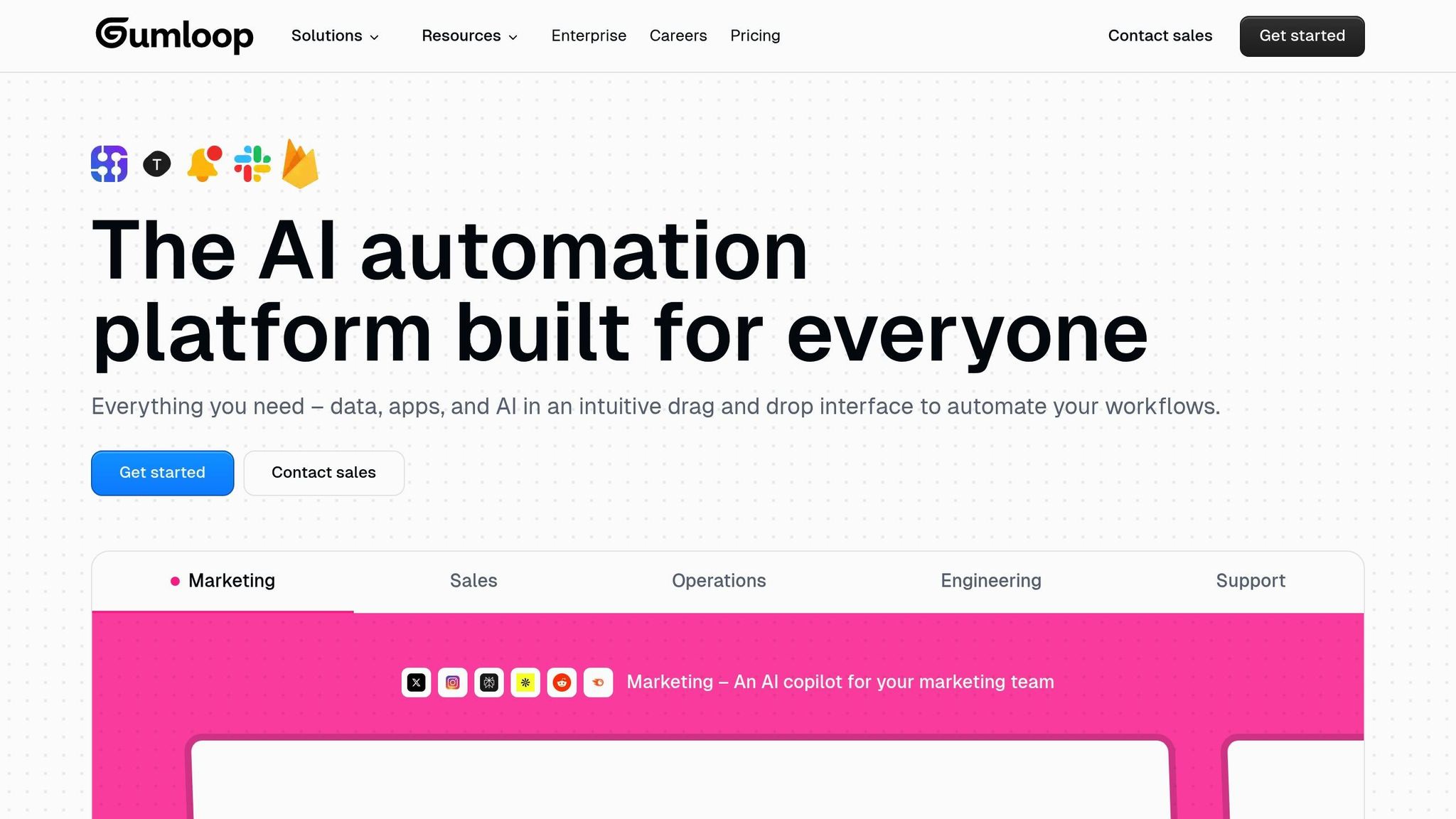
Gumloop is an AI automation platform tailored for organizations aiming to streamline operations with intelligent automation.
At the heart of Gumloop's flexibility is its modular node system. With over 105 native nodes available through a user-friendly drag-and-drop visual builder, the platform simplifies tasks like data loading, AI processing, text manipulation, and integrations with popular business tools such as Salesforce, Slack, Gmail, and AWS.
One of Gumloop’s standout features is its AI-powered MCP nodes, which allow users to describe actions in plain language. The platform then translates these descriptions into actionable steps.
"What really sets Gumloop apart is its use of AI-powered MCP nodes. Instead of hunting through a menu of prebuilt actions or stringing multiple steps to get what you need, you describe what you want to do in plain language and Gumloop creates a working step that does exactly that. It's not just faster, it often unlocks more powerful and specific functionality than a traditional integration would allow."
Gumloop also supports seamless switching between leading AI models like OpenAI (GPT-4, GPT-4o, GPT-4o-mini), Anthropic (Claude 3.5 Sonnet, Claude 4 Sonnet), Deepseek V3 R1, and Gemini 2.5 Pro, all with a single click. Users can customize prompts without needing to write code. Additionally, subflows enable embedding entire workflows as nodes, making it easier to reuse and manage complex processes.
These capabilities provide the foundation for secure and efficient operations.
Security and compliance are central to Gumloop’s design. The platform includes detailed audit logging to track actions and metadata, ensuring thorough oversight.
Gumloop complies with major industry standards like SOC 2 Type II, HIPAA, and GDPR. Sensitive credentials and logs are encrypted both at rest and during transit, with logs isolated by organization. Role-Based Access Control (RBAC) allows administrators to define custom user roles with precise permissions over specific nodes and integration scopes. For sensitive workflows, Incognito Mode ensures real-time data wiping. Administrators can also manage AI model access to meet regulatory and data residency requirements.
With its focus on interoperability and governance, Gumloop is built to scale for businesses of all sizes. Companies such as Webflow, Rippling, and Instacart rely on the platform to streamline workflows and enhance efficiency. Leaders from these organizations have highlighted Gumloop’s ability to simplify operations and drive results.
The platform offers flexible pricing plans to suit various needs:
For larger organizations, Gumloop provides centralized control with features like shared credit pools, auto-adding users based on company domains, and robust security settings. Enterprise-level options include Virtual Private Cloud (VPC) deployments for data isolation, AI proxy routing for custom endpoints, auto-scaling compute resources, and access to dedicated premium support.
These features make Gumloop a powerful solution for businesses seeking to integrate AI automation seamlessly into their operations.
n8n is an open-source workflow automation platform designed to bring enterprise-level AI orchestration to organizations of all sizes. Its intuitive, node-based interface and extensive integrations make it possible for teams to create advanced AI workflows without being confined to proprietary systems.
With more than 500 pre-configured integrations, n8n connects seamlessly to a wide range of applications. For situations where a specific integration isn’t available, the HTTP Request node enables connections to any REST API, ensuring flexibility across platforms. A key feature is the MCP Server Trigger, which facilitates two-way communication with external AI systems - allowing workflows to both receive triggers from AI agents and send data back. Additionally, users can customize workflows further by incorporating JavaScript or Python code via the code node, and self-hosted setups support adding npm packages for even greater functionality.
n8n’s interface supports creating multi-agent systems with features like branching, looping, and dynamic workflow adjustments. Built-in AI nodes manage essential tasks, while integration with frameworks like LangChain allows for modular applications that fit into existing processes. Users can choose from various AI model providers or run models locally, offering unparalleled flexibility. Workflow triggers range from app events and cron jobs to chat interactions, event streams, and webhooks, with options to include human-in-the-loop interventions for approvals or safety checks.
SanctifAI, a leader in human-AI collaboration, used n8n to empower over 400 workers in their AI workflows. They found n8n more adaptable than LangChain tools, enabling them to set up their first workflow in just two hours - three times faster than coding Python controls for LangChain.
This versatility also supports cost predictability.
n8n uses an execution-based pricing model, charging only for completed workflow runs, which simplifies cost management for complex automations. Since August 2025, the platform removed restrictions on active workflows, steps, and users across all plans, encouraging experimentation and widespread adoption. For self-hosting, the Community Edition remains completely free, offering unlimited workflows and executions.
Paid plans start at $20 per month for the Starter plan, which includes 2,500 workflow executions. The Pro plan, priced at $50 per month, supports up to 10,000 executions. The Business plan, at $667 per month (billed annually), offers advanced features like SSO, SAML, LDAP, and Git version control for self-hosted deployments. One design agency migrated from Make.com in January 2025 and scaled from 1.5 million to 9.5 million monthly operations within 11 months. This transition saved them $87,360 annually while managing six times the workload at 23.75 times lower cost per operation.
"Pay for full executions, not for each step. Unlike other tools that charge per step or user, n8n lets you build freely and only pay when a workflow runs from start to finish."
– n8n.io
This pricing model makes n8n a scalable choice for organizations of all sizes.
n8n’s queue mode architecture separates webhook intake from workflow execution, using parallel processing to handle high volumes efficiently. Tests show it can process up to 162 requests per second with latency under 1.2 seconds - a tenfold increase in throughput compared to single mode.
For high-volume operations, n8n supports parallel processing with features like the "Split In Batches" node, which divides large datasets, and load balancing across multiple instances. Performance optimizations, such as caching API responses, batching, and throttling, can cut execution times by 40–60%. Upgrading hardware - such as adding more RAM, faster disks, or shared storage like S3 - further improves throughput and reduces latency. These capabilities make n8n an efficient tool for managing integrated AI workflows [45,48].
Success stories highlight n8n's enterprise-grade capabilities. A manufacturing company reduced manual data entry by 70% by integrating n8n with a legacy ERP system via a REST API wrapper. Meanwhile, a healthcare organization achieved a 94% drop in system downtime through automated recovery workflows. A financial services firm now processes over 2 million customer transactions daily using n8n workflows.
Smaller businesses also see measurable gains. A marketing agency saved five hours per week by automating client data transfers between its CRM and project management tools. Similarly, an e-commerce retailer reduced order fulfillment time from four hours to just 30 minutes daily while eliminating shipping errors that previously affected 5% of orders.
"Enterprise automation is no longer about simply passing repetitive tasks to machines - it's about building scalable, intelligent workflows that drive transformation across every corner of your organization."
– Dejan Markovic, co-founder HYPESTUDIO
| Plan Type | Price per Month | Key Scalability Features | Target User |
|---|---|---|---|
| Community | Free | Self-hosted, unlimited workflows, steps, users | Individual users, small teams |
| Starter | $20 | Cloud hosting, unlimited workflows, steps, users | Small businesses, startups |
| Pro | $50 | Cloud hosting, unlimited workflows, steps, users | Medium-sized businesses |
| Business | $667 | Advanced collaboration, Git version control, SSO, LDAP | Growing teams, SMBs |
| Enterprise | Custom | Dedicated support, advanced security, custom hosting | Large organizations |
n8n’s ability to evolve with emerging technologies, coupled with its customizable nodes and robust API connectivity, ensures it remains a reliable long-term solution for organizations embracing AI-driven automation.
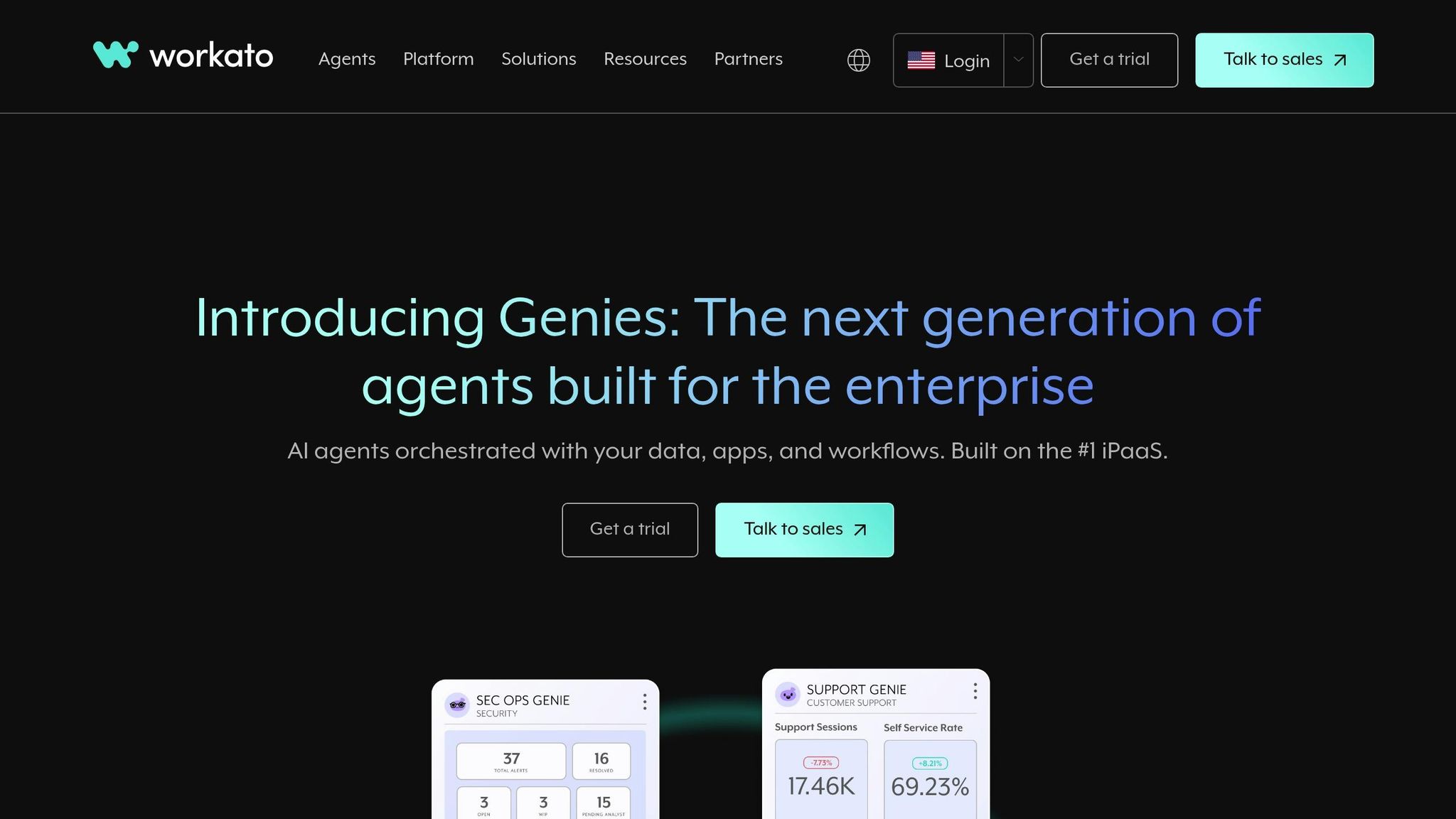
Workato presents itself as a top-tier integration platform designed to revolutionize how organizations manage AI workflows across their tech ecosystems. Built on AWS, it connects various systems and AI models through an intuitive, recipe-based low-code automation framework.
Workato simplifies integration with over 1,000 pre-built connectors for popular SaaS platforms like Salesforce, Slack, Workday, and SAP. It also bridges the gap between AI models, offering connectivity to leaders like OpenAI, Google Gemini, Amazon Bedrock, and Azure OpenAI. This makes it easier to embed AI capabilities into existing business processes.
The platform's low-code, recipe-based automation ensures real-time data synchronization and minimizes manual tasks. For instance, Monks, a digital advertising agency, used Workato's Genie agent during 34 global mergers to unify systems and eliminate data silos - all while maintaining security standards.
Similarly, Asana's Integration Architect, Protik Ganguly, leveraged Workato to enhance CRM workflows. By incorporating AI-driven features, Asana improved marketing analysis, automated follow-up emails, and streamlined note updates. This allowed their sales team to focus on more impactful interactions.
Workato's Embedded feature takes integration a step further, offering access to over 1,200 pre-built connectors. Organizations can expose these integrations as APIs, making workflows accessible to both internal and external stakeholders.
Workato prioritizes security and compliance, ensuring that AI workflows meet rigorous standards. AI agents are treated as system users with distinct identities, limited access, and traceable actions, adhering to least privilege principles. For generative AI, the platform employs safeguards like structured prompts, contextual grounding, and human oversight for high-risk scenarios.
Every action performed by AI agents is logged and traceable, giving security teams the tools they need for audits and anomaly detection. Workato's Safe AI Governance Framework ensures that AI actions are secure, explainable, and controlled. As Workato emphasizes:
"Compliance isn't just a checkbox - it's essential to building trust in agent behavior. In enterprise environments, agents must meet the same standards as any other system interacting with regulated data."
The platform also enforces strict data privacy measures. User data is never used to train AI models, and "AI by Workato" processes data within the same region as its source data center (US, EMEA, APAC). Workato complies with major standards like PCI DSS Level 1, ISO 27001, ISO 27701, SOC 2 Type 2, SOC 1 Type 2, HIPAA, GDPR, and IRAP, offering advanced features like Enterprise Key Management (EKM) for customer-controlled encryption using tools like AWS KMS.
| Compliance Feature | Capability | AI-Specific Benefit |
|---|---|---|
| AI Agent Governance | Identity management, scoped access, ownership | Ensures accountable AI operations |
| Audit Logging | Full action tracking from trigger to execution | Provides transparency for AI decisions |
| Data Privacy Controls | No AI model training with user data, regional processing | Protects sensitive information in workflows |
| Regulatory Compliance | Adherence to GDPR, HIPAA, EU AI Act | Meets global governance standards |
Workato's architecture is designed to support organizations of all sizes, though its enterprise-grade capabilities shine for mid-to-large businesses. Its tiered pricing model scales with organizational needs, starting at around $50,000 annually for enterprise plans that include advanced governance, SOC 2 compliance, multi-environment support, and premium connectors.
The platform focuses on empowering users to scale automation efficiently. Through role-based access controls, Workato encourages more users to become "builders." As Mohit Rao, Head of Intelligent Automation, explains:
"Business users have organically started using Workato. Once we identify those business users, we elevate them to be champions to empower other teams or other people, and use them to get the next wave of scale."
Workato's usage-based pricing accounts for factors like recipes, tasks, connectors, and workload concurrency. To help organizations manage costs, the platform provides a Usage Dashboard with real-time metrics, budget alerts, task-level logs, and cost analytics.
Additionally, Workato University and Automation HQ equip users with the knowledge to scale automation effectively. The platform supports advanced architectural patterns, including event-driven architectures with Kafka, scalable ETL/ELT pipelines, and a no-code "Workflow Apps" feature for quickly building enterprise-grade applications.
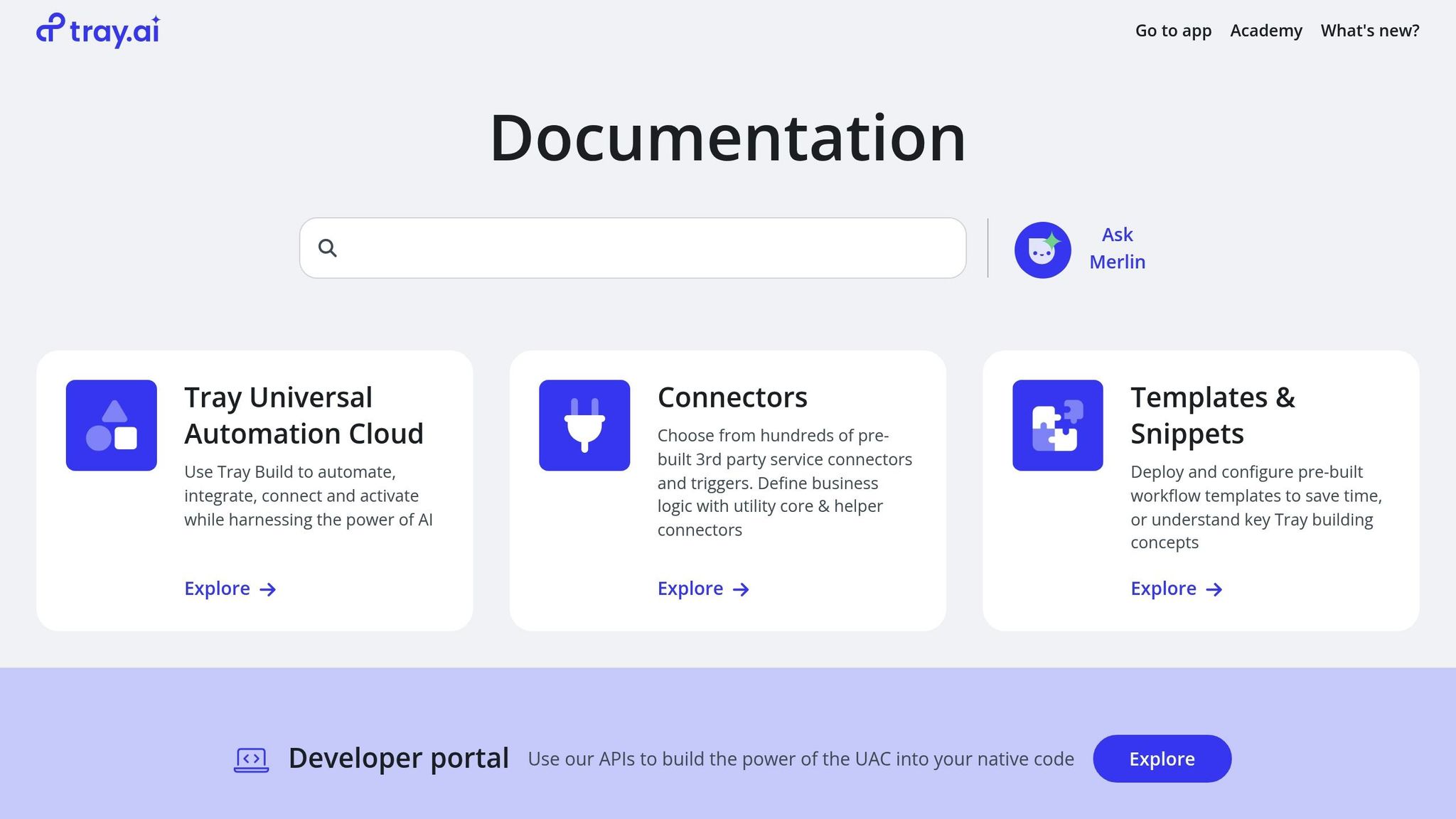
Tray.io is a platform designed to bring ambitious AI goals into reality by focusing on integration, security, and control. Acting as both an integration platform as a service (iPaaS) and an AI orchestration hub, it allows organizations to manage AI, integration, and automation efforts within a single environment.
"The blockers aren't ambition - they're integration, security, and control"
Tray.io stands out for its ability to connect AI agents with an organization's entire tech ecosystem, ensuring context is preserved and real data is used effectively.
The platform's Agent Hub serves as a centralized catalog of reusable Smart Data Sources, AI tools, and accelerators. These can be deployed across various environments, including Slack, web applications, and APIs. Tray.io also provides direct connectors to widely used business platforms such as Salesforce, Slack, NetSuite, Snowflake, JIRA, Zendesk, HubSpot, and OpenAI. Its AI Palette gives users native access to vector databases, large language models (LLMs), and other specialized AI tools, while also enabling the creation of multi-threaded Retrieval Augmented Generation (RAG) pipelines.
The platform's Agent Accelerators showcase its practical adaptability through pre-built solutions:
With these integrations in place, Tray.io also focuses on maintaining robust security and governance.
Tray.io builds governance and compliance into its foundation through its Enterprise Core, which centralizes control, scalability, and instrumentation for all AI agents and automation initiatives.
Merlin Guardian, a key feature, provides guardrails for AI processes by implementing privacy controls, tokenization, and access management. This ensures sensitive data remains secure, while maintaining visibility and adhering to regulatory requirements.
The platform holds SOC 2 Type 2 certification, with annual third-party audits to verify its security practices. It complies with regulations such as GDPR, HIPAA, and CCPA, offering data residency options in the US, EU, and APAC regions. For healthcare organizations, Tray.io supports electronic protected health information (ePHI) through data minimization and provides Business Associate Agreements (BAAs).
Security measures include comprehensive data encryption, HTTPS for all communications, and regular penetration testing by independent firms. Flexible log retention policies allow organizations to store logs for as little as 24 hours or up to 30 days, with options to stream logs to external SIEM systems. Additionally, step isolation provides detailed visibility into execution steps, aiding in testing, debugging, and prompt engineering.
"We take data security very seriously. We provide a multi-step, multi-level security system with complete transparency so you not only feel safe, you can see how safe your data is, anytime."
Tray.io is built to scale effortlessly, making it ideal for enterprises. Its serverless, elastic architecture automatically adjusts computing resources based on demand, eliminating the need for manual infrastructure management - even during peak periods.
This scalability has delivered real results for enterprise clients. For instance:
The platform supports a wide range of data processing needs, from handling moderate workloads to managing large-scale operations involving hundreds of thousands of rows through its data warehousing capabilities. For complex tasks, workflow threads enable parallel processing to reduce execution times.
Luke Smith, Senior Solutions Engineer at Tray.io, highlights the platform's scalability:
"Scalability is essential; Tray.io's serverless architecture automatically adjusts to demand. It's not just about speeds and feeds. It's all about elasticity, governance, security, and scaling with that stack change as well."
Tray.io employs a capacity-based enterprise pricing model with custom pricing options. This positions the platform to thrive in the expanding iPaaS market, which is projected to grow from $10.5 billion to $71.35 billion by 2030, at an annual growth rate of 32.3%.
Selecting the right AI workflow platform hinges on your organization’s size, technical expertise, and automation needs. Each platform brings distinct advantages in areas such as governance, cost management, and usability. Here’s a breakdown of what each platform offers.
Prompts.ai stands out as a versatile AI orchestration platform, integrating over 35 leading large language models - like GPT-5, Claude, LLaMA, and Gemini - into a unified, secure interface. Its real-time cost tracking allows organizations to reduce AI software expenses by up to 98%. With a pay-as-you-go model starting at $0 and scaling up to $129 per member per month, it combines cost transparency with enterprise-level compliance, making it a strong choice for businesses aiming to streamline operations.
Gumloop caters to solo users and smaller teams with its all-in-one subscription model. At $37/month for individuals and $244/month for teams, it includes built-in LLM models without requiring external API keys. Its visual canvas and integrated AI assistant simplify workflow creation, even for non-technical users. As Fidji Simo, CEO at Instacart, shared:
"Gumloop has been critical in helping all teams at Instacart – including those without technical skills – adopt AI and automate their workflows, which has greatly improved our operational efficiency."
n8n appeals to technically skilled teams seeking flexibility. This open-source platform offers free self-hosting or cloud plans starting at $24/month. With over 500 integrations and advanced features like custom nodes and support for Python and JavaScript, n8n enables rapid development. For instance, SanctifAI rebuilt a four-week AI feature in just 10 minutes using n8n, achieving deployment speeds three times faster than traditional Python setups. These capabilities make it a strong fit for organizations needing customizable automation.
Workato is designed for large enterprises with complex integration requirements. Its custom enterprise pricing ranges from $10,000 to over $100,000 annually. Recognized as a Gartner leader, Workato leverages AI to streamline processes like data mapping, document handling, and sentiment analysis. Its robust framework includes role-based access controls and detailed audit logs, ensuring security and compliance for enterprise-level operations.
For mid-market and enterprise organizations dealing with intricate data workflows, Tray.io offers a low-code automation platform tailored for complex data transformations. With a focus on API-heavy workflows and advanced debugging tools, Tray.io is ideal for businesses managing data-intensive operations.
The table below highlights key differences among these platforms:
| Platform | Starting Price | Core Strengths | Best For | Integration Count | Governance Features |
|---|---|---|---|---|---|
| Prompts.ai | $0/month (Pay-as-you-go) | 35+ unified LLMs, cost reduction up to 98% | Enterprises eliminating tool sprawl | 35+ AI models | Enterprise audit trails, compliance controls, real-time cost tracking |
| Gumloop | $37/month (Solo plan) | Built-in LLMs, integrated AI assistant | Solo creators and growing teams | Built-in LLMs | Basic security and admin controls |
| n8n | Free (Open-source) | Open-source flexibility, developer control | Technical teams, custom workflows | 500+ integrations | SOC2 compliance, human-in-the-loop, role-based access |
| Workato | $10K–$100K+ annually | 1,200+ connectors, enterprise-grade governance | Large enterprises, complex integration needs | 1,200+ connectors | Role-based access, audit logs, lifecycle management |
| Tray.io | Enterprise pricing | API-heavy workflows, low-code automation | Mid-market/enterprise, data-intensive processes | - | - |
Each platform’s pricing reflects its target audience. Prompts.ai and Gumloop offer straightforward, accessible pricing for teams of all sizes, while n8n provides a cost-effective, open-source option for technical users. For enterprises with advanced governance and integration needs, Workato delivers a proven solution, while Tray.io excels in handling complex, data-heavy workflows.
Selecting the right AI workflow platform is essential for aligning with your organization’s needs and growth ambitions. Each platform discussed in this guide addresses specific areas of AI automation, from cost transparency and model integration to enterprise-level governance and developer adaptability. This summary emphasizes cost efficiency, scalability, and integration speed to simplify your decision-making process.
Understanding costs is a crucial step. Currently, only 51% of organizations feel confident in evaluating their AI return on investment, while 15% don’t track costs formally. Real-time cost visibility is key to ensuring sustainable AI deployment. As Nicole Replogle highlights:
"Businesses that integrate AI will move faster, operate leaner, and deliver more personalized experiences".
This insight reinforces the importance of balancing strategic cost management with technical execution.
The integration landscape is advancing quickly. A significant 87% of enterprise developers now use low-code solutions, many of which include pre-built connectors. As AI adoption grows, scalability becomes even more critical. Gartner projects that by 2026, over 70% of enterprises will depend on frameworks to coordinate automation and guide strategic decisions across the organization. Companies with strong AI foundations are expected to achieve 20–30% faster time-to-market. These trends tie back to earlier challenges like interoperability, governance, and cost management, creating a cohesive picture of the evolving AI ecosystem.
"The right framework transforms AI from a set of tools into an intelligence engine that unifies operations, generates actionable insights, and drives growth." – Rapidops
To ensure success, align platform capabilities with your strategic goals. Consider pilot projects to validate your choice, establish clear KPIs, and prepare your team for implementation. Whether your focus is on unified model access, open-source flexibility, enterprise governance, or specialized workflows, the key is matching the platform’s strengths to your organization’s maturity and objectives.
The future of AI workflow automation is rapidly approaching, with AI-enabled workflows expected to grow from 3% to 25% of all enterprise processes by the end of 2025. Your chosen platform should not only address today’s challenges but also prepare your organization for the opportunities ahead.
When choosing an AI workflow platform, it's essential to focus on factors that align with your business objectives. Start with security - look for platforms that provide robust encryption and comply with industry standards to safeguard your data. Scalability should also be a priority, ensuring the platform can expand as your business grows. A straightforward, user-friendly interface can make adoption smoother and streamline daily operations.
It's also worth considering how well the platform integrates with your current tools and workflows. Check if it supports your specific use cases and adheres to data privacy regulations. By weighing these elements, you can select a platform that enhances productivity, protects sensitive information, and evolves alongside your business.
AI workflow platforms place a strong emphasis on data security and regulatory compliance, aligning with globally accepted standards like ISO/IEC 27001 and the NIST Cybersecurity Framework. These frameworks provide a solid foundation for managing risks and protecting sensitive data effectively.
To enhance security further, many platforms integrate AI-driven security tools. These tools help safeguard confidential information, automate compliance monitoring, and address regulatory obligations seamlessly. Built-in features such as risk assessments, sensitivity classification, and compliance tracking work proactively to identify and mitigate potential risks, fostering confidence and dependability in AI-powered operations.
AI workflow platforms offer tremendous value for small businesses, helping to simplify operations and optimize resources. By automating repetitive tasks, these tools not only save time but also improve decision-making and increase efficiency - key benefits for businesses with limited budgets and manpower.
What’s more, many of these platforms are built to grow alongside your business. You can start small, implementing manageable solutions, and expand as your needs evolve. This gradual approach allows small businesses to harness AI effectively, driving growth and streamlining daily operations without overwhelming their existing systems.


